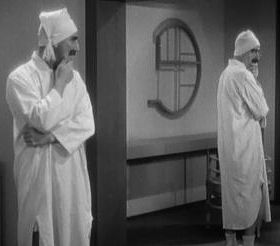284. Seeing is Believing: Nicholas of Autrecourt’s Skeptical Challenge
The debate between Nicholas of Autrecourt and John Buridan on whether it is possible to achieve certain knowledge.
Themes:
• L.M. De Rijk (ed. and trans.), Nicholas of Autrecourt: his Correspondence with Master Giles and Bernard of Arezzo (Leiden: 1994).
• L.A. Kennedy et al. (trans.), Nicholas of Autrecourt: the Universal Treatise (Milwaukee: 1971).
• C. Grellard, Croire et savoir: les principes de la connaissance selon Nicolas d’Autrécourt (Paris: 2005).
• H. Lagerlund (ed.), Rethinking the History of Skepticism: the Missing Medieval Background (Leiden: 2010).
• E.A. Moody, “Ockham, Buridan, and Nicholas of Autrecourt,” Franciscan Studies 7 (1947), 113-46.
• P. King, “Jean Buridan’s Philosophy of Science,” Studies in History and Philosophy of Science 18 (1987), 109-32.
• J.M.M.H. Thijssen, “John Buridan and Nicholas of Autrecourt on Causality and Induction,” Traditio 43 (1987), 237-55.
• J.M.M.H. Thijssen, “The Quest for Certain Knowledge in the Fourteenth Century: Nicholas of Autrecourt against the Academics,” in J. Sihvola (ed.), Ancient Scepticism and the Sceptical Tradition (Helsinki: 2000), 199-223.
• T.K. Scott, “Nicholas of Autrecourt, Buridan and Ockhamism,” Journal of the History of Philosophy 9 (1971), 15-41.
• J.R. Weinberg, Nicholas of Autrecourt: a Study in 14th Century Thought (Princeton: 1948).
• J. Zupko, “Buridan and Skepticism,” Journal of the History of Philosophy 31 (1993), 191-221.







Comments
Dear Peter,
Dear Peter,
Isn't it better to postpone the Africana Philosopy until the modern philosophy is covered? Most of the definitions of Africana Philosophy I've seen includes the philosophy of African diaspora, and that diaspora formed only after 1500's. Hence their philosophy must have evolved in dialogue with rationalists/empiricists/enlightment philosophers.
Consider Haitian revolution. This is a momentous event in the history of African diaspora, and no doubt generated its own philosophy. But is it possible to understand it without first understanding the enlightement ideals?
And, considering the state of the written sources in pre-1500 sub-saharan Africa, most of the Africana philosophy must have consisted of post-1500 diaspora philosophy.
In reply to Dear Peter, by mehmet
When to do Africana?
Yes, that's a good point and one I had considered myself - in fact the same thing happened with the Islamic world, where towards the end I was mentioning influence of 19th c. thought on Muslim intellectuals. On the other hand you could argue Africana is well overdue, from the other extreme, because I should have covered Egypt before doing Greece! In any event as a practical matter, I think it is better just to sketch the Enlightenment ideas or other influences as we go along; we would need to do that anyway, if only to remind the listener. And if I waited until we were up to the 19th century or whatever it would be a long wait!
A Worthy Subject- Thanks
I discovered Nicholas of Autrecourt about 4 months ago reading Copleston's "History of Philosophy." Autrecourt's anticipation of Hume was a relevation when I discovered it and still is. In my studies, it appears that this debate centers on two issues: (a) does episteme exist? and (b) if it does, how does one discover it? I am using Aristotle's definition of episteme: non-continent truth which transcends time and culture. I think if anything, my view of the history of philosophy is that it is inherent in human nature to believe in and seek episteme. I think Pascal would call this part of the "God created void" in human nature; Kant would probably call it part of the "archetonic (sic) structure of reason"; Hegel would probably call it part of the innate desire contained in human self-consciousness. But this desire seems to me to be inborn in all humans and is demonstrated thoughout all human history. But, just because there is an innate desire for episteme, does not mean it exists (Kant's point, I believe). Thus, the issue is how does one prove or disprove a concept or an assertion is or is not episteme? I like the point you made in your Indian philosophy presentation on the Naya, when setting out the three types of questioning (or debates): (a) those seeking the truth, (b) those seeking to win the argument without any care for the truth, and (c) the skeptic who seeks not to make a point directly, but simply to prove his point by attacking his opponents assertion/concept. I think the outcome of the search for an method to discover episteme will depend in large part on the type of search/question one is engaged in. I think (but do not know), that Autrecourt was seeking the truth and figured out that Aristotle was incorrect in his assertion in Posterior Analytics that episteme can be proved by "demonstration." Autrecourt, in my opinion, correctly concluded that the Aristotle was simply wrong on this point and all one can do in deciding if an "object" is or is not episteme is to weigh evidence and in doing so, all we can hope to accomplish to be "probably correct." In the law, all factual issues are decided by three components: (a) burden of proof, (b) evidentiary standard, and (c) admissible evidence. Autrecourt never got that far down the road on his realization that existence of episteme is not decided by deductive logic but rather by the weighing of evidence; the Church intervened and ended the discussion. This model, if developed out, could have changed history. For the more discerning reader, I am not asserting the legal method of deciding factual issues applies to the "Naturwissenschaften" (hard sciences); I am asserting that it applies to the "Geisteswissenschaften". I am really looking forward to your next discussion on this topic. Have a great vacation.
About the lesser known skeptics mentioned on the episode
Hi Peter,
I would like to thank you for your podcast. For someone like me, with very little time to sit and read and no formal education but lots of time to listen to stuff while doing repetitive tasks, it has been life-changing. Unlike most other hosts out there, you use simple vocabulary and assume people won't know about any philosopher you haven't talked about yet, while on the other hand not assuming "the common people" are stupid and making me feel bored and spoon-fed. And I am deeply thankful for that.
I'd like to ask you about the lesser known skeptics mentioned in the last 5 minutes of the episode. How do you spell their names? They don't seem to appear in the Timelines.
Thank you so much,
Pablo
In reply to About the lesser known skeptics mentioned on the episode by Pablo
More skeptics
Wow, thanks! That is of course exactly what I'm aiming for with the podcast so it is great to hear that for you at least it is hitting the target. I really appreciate your writing in to say that.
As for the minor skeptics, it would be appropriate for me to say "not sure", but also not helpful. So, instead I checked and it looks like I mentioned John of Mirecourt, Robert Holcot, and Nicholas Aston. Pretty minor figures, maybe Holcot is marginally the better known of the three? (Now I am going to get an indignant response from an Aston scholar.)
Add new comment